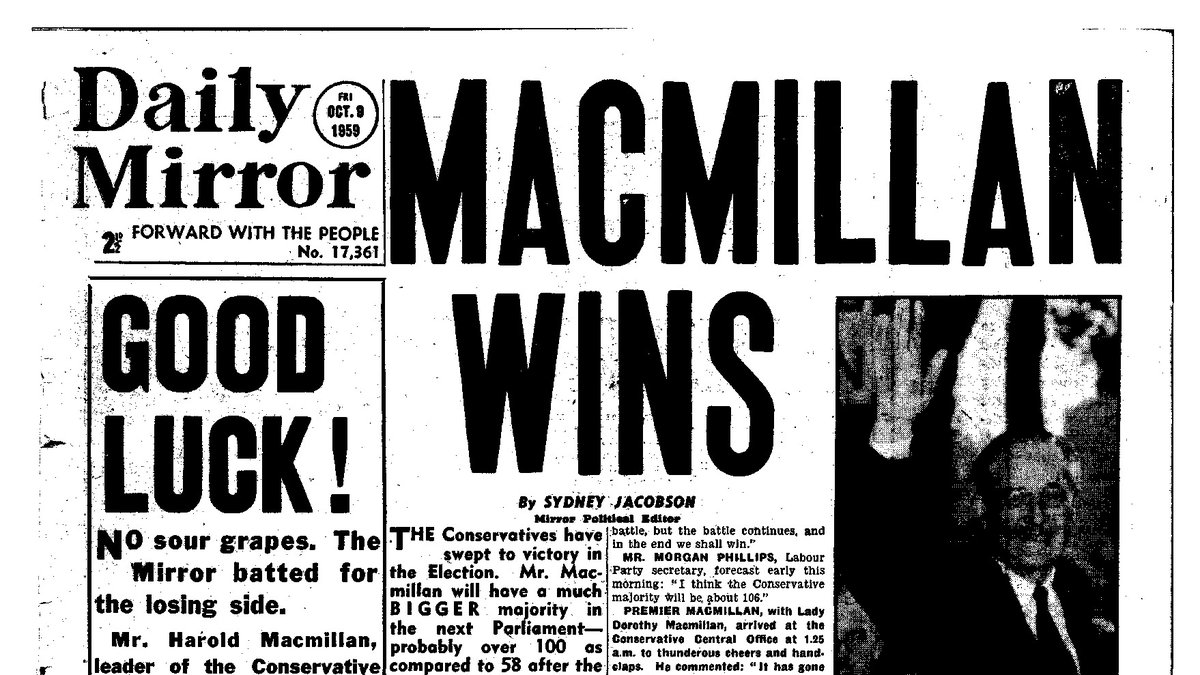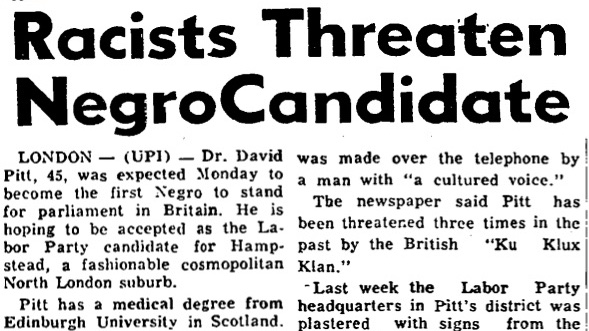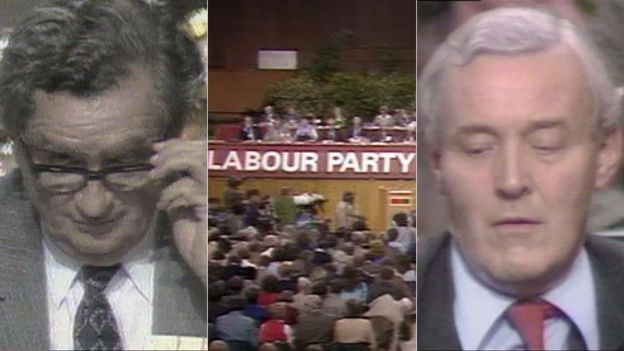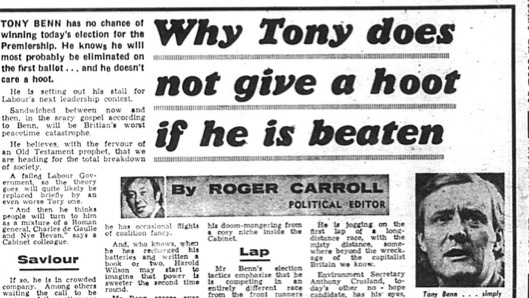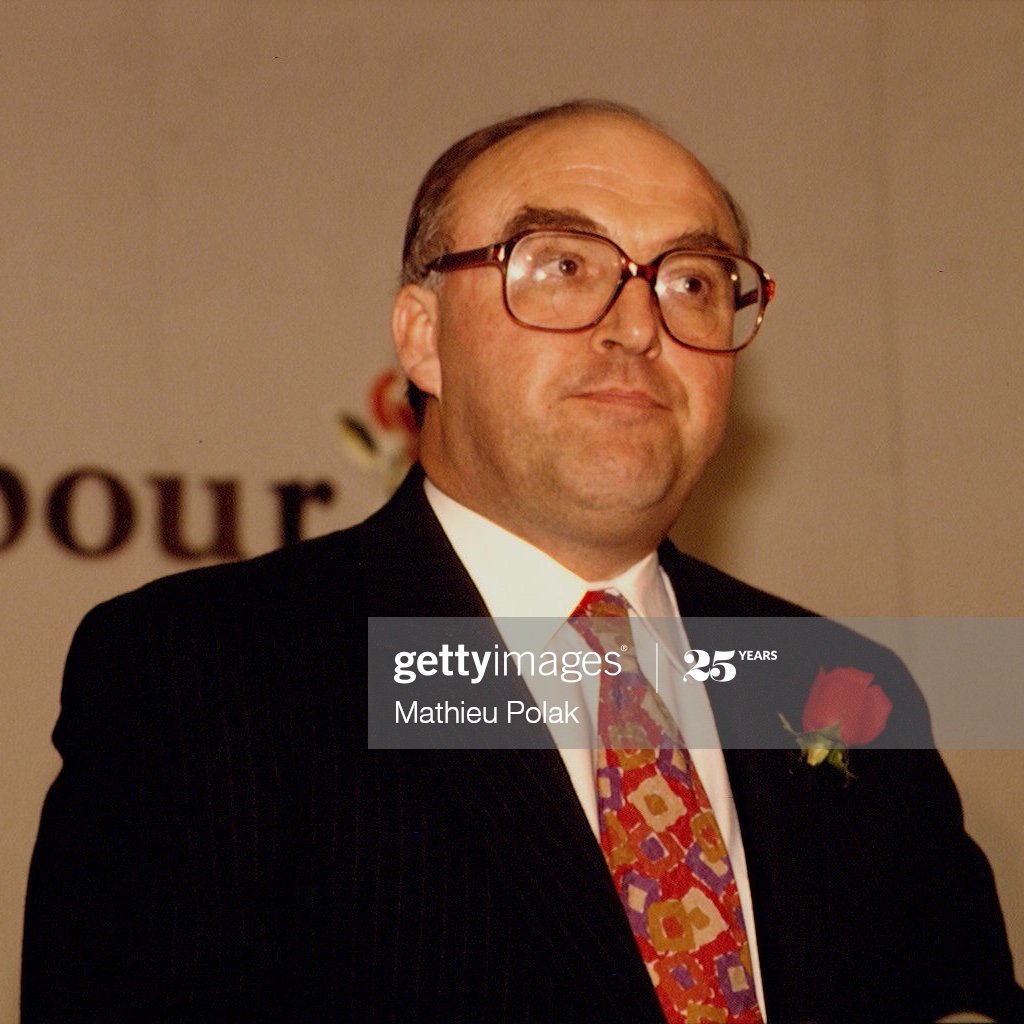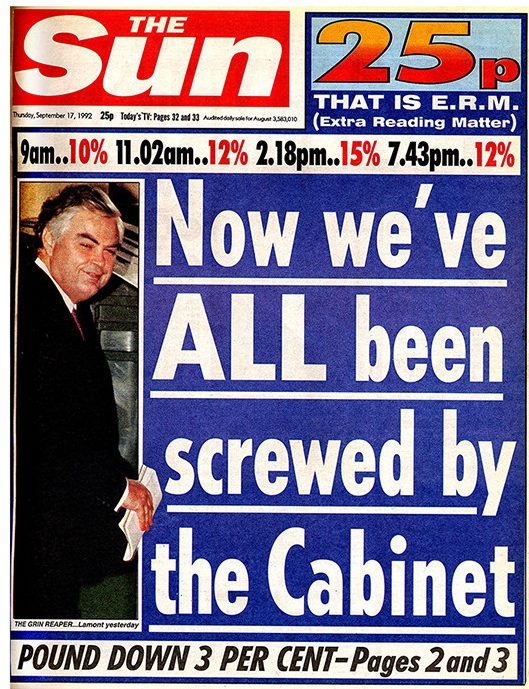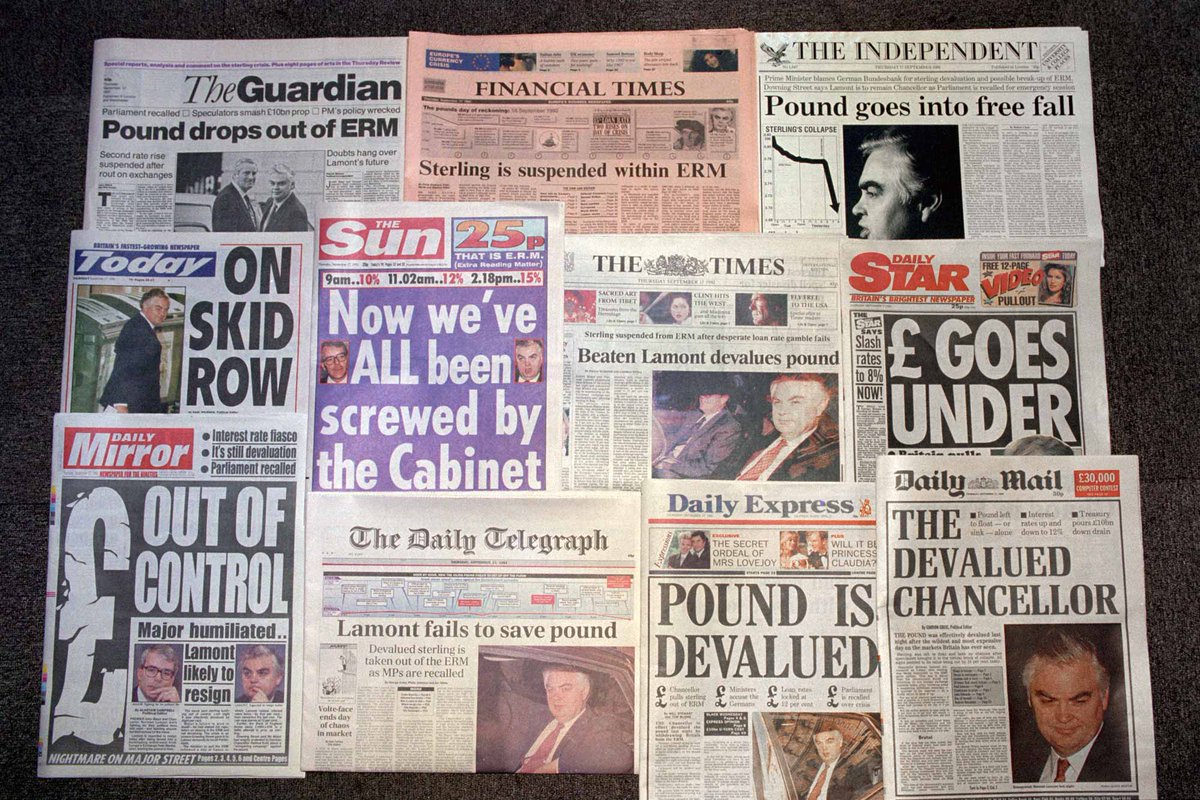
#OTD 1959. General Election. Shock as Labour suffer third defeat in a row and 'SuperMac' triumphs
Despite Suez - and eight years of Conservative rule - voters agree that 'they've never had it so good'....
A thread on the result that triggered the question: ‘Must Labour Lose?’
Despite Suez - and eight years of Conservative rule - voters agree that 'they've never had it so good'....
A thread on the result that triggered the question: ‘Must Labour Lose?’

Gaitskell and Bevin were in Leningrad when news was announced that Harold MacMillan had called a General Election. 

In the years prior to 1959, many had expected Labour to win the next election.
In February 1957, Labour won the seat of North Lewisham in what was their first by-election gain from the Tories in almost twenty years.
In February 1957, Labour won the seat of North Lewisham in what was their first by-election gain from the Tories in almost twenty years.
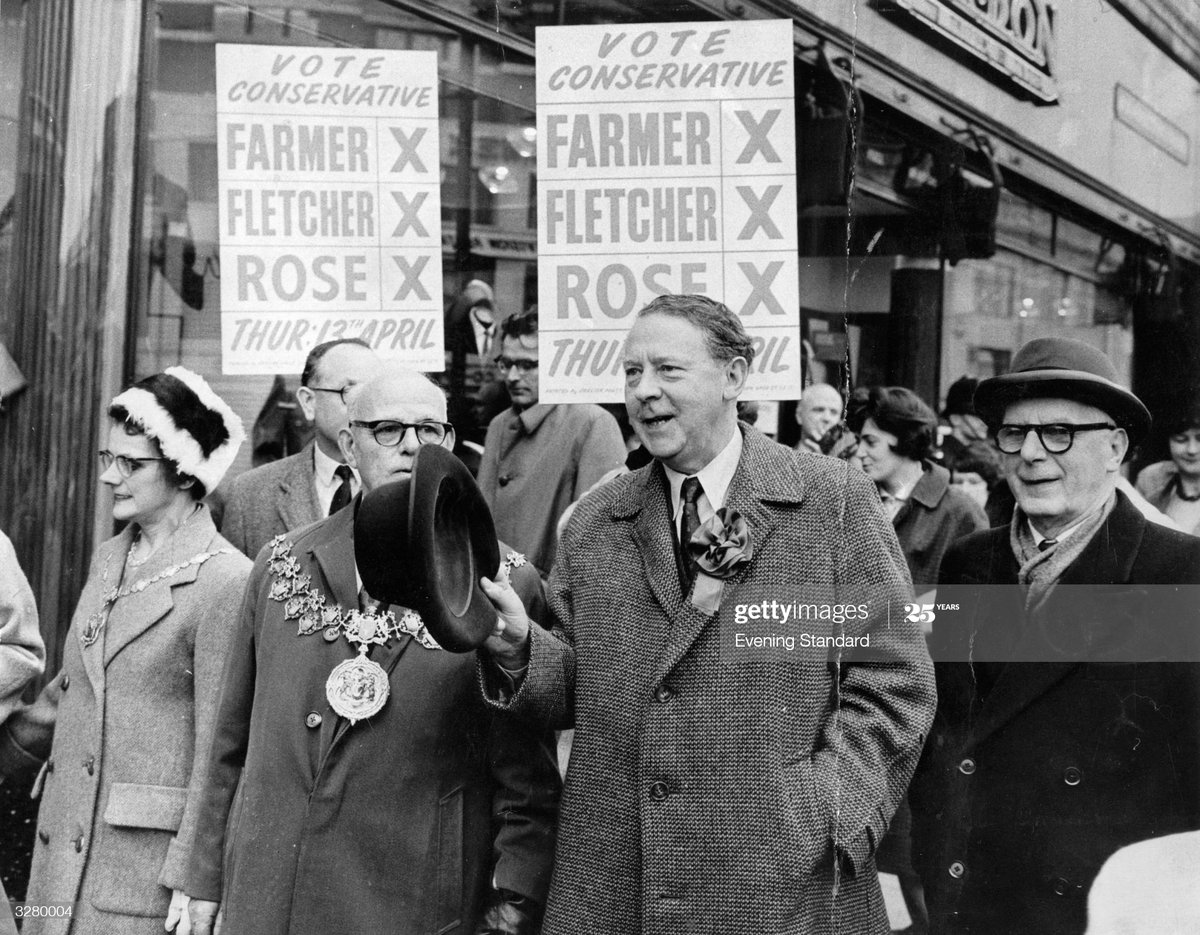
Statisticians calculated that should it be repeated, Labour would secure a majority of 85 seats at the next election.
Macmillan called a Cabinet meeting especially to discuss the defeat.
Macmillan called a Cabinet meeting especially to discuss the defeat.
Macmillan's famous declaration that 'most of our people have never had it so good' came in July 1957 
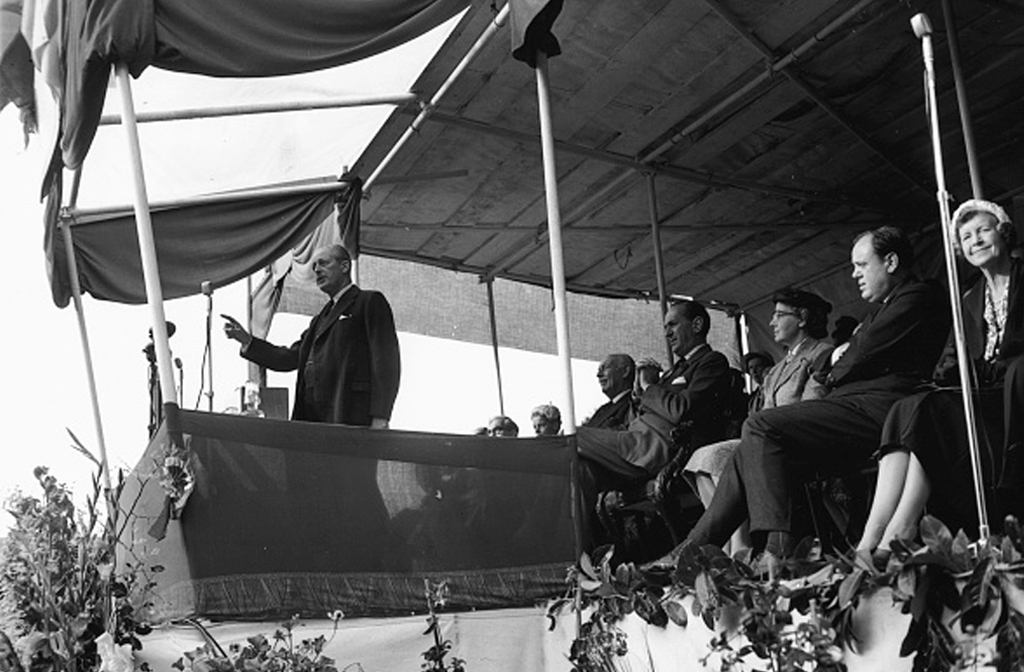
In September 1957, Labour increased their majority in the marginal seat of Gloucester from 748 to 8,374 after a Liberal surge.
Gaitskell declared that ‘The people of Gloucester have said in plain terms that it is time for a change’.
Gaitskell declared that ‘The people of Gloucester have said in plain terms that it is time for a change’.
By the time of the 1959 election, Macmillan had turned the Tories fortunes around.
In August he benefited from the state visit of President Eisenhower as the pair drove through London in an open topped Rolls Royce.
In August he benefited from the state visit of President Eisenhower as the pair drove through London in an open topped Rolls Royce.
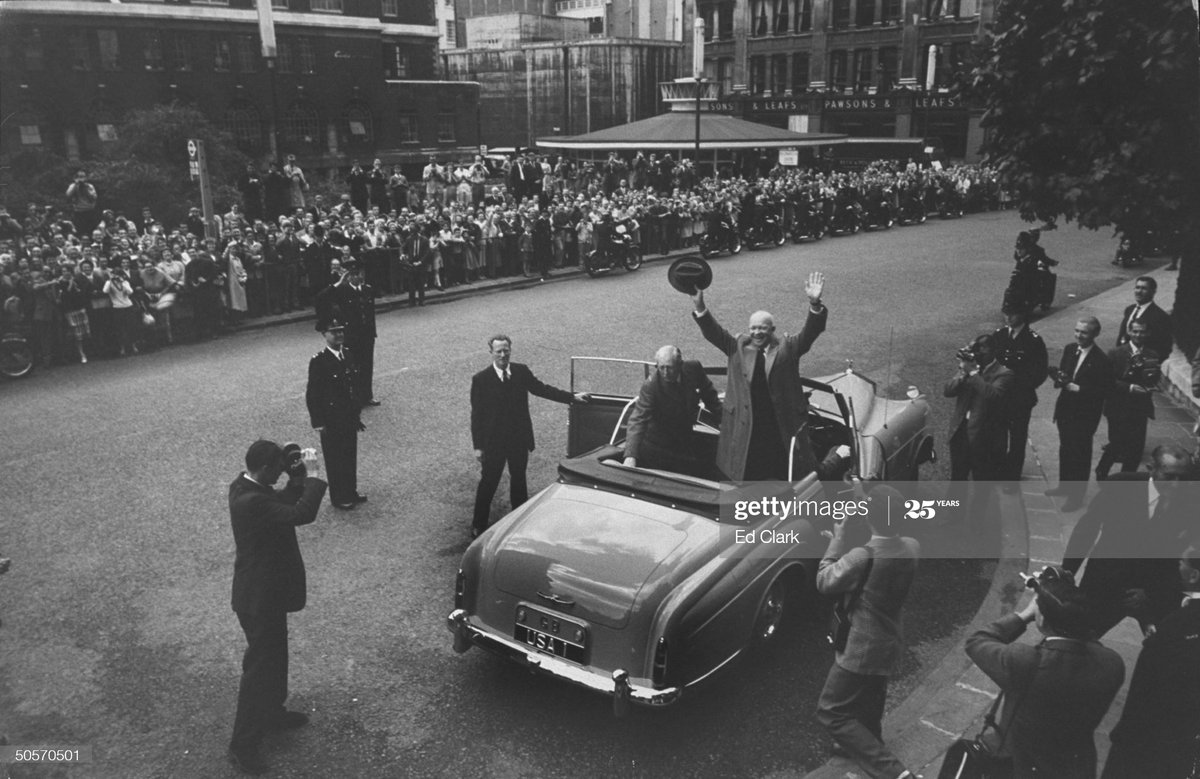
Much of the campaign was dominated by the rise of the ‘Don’t Know’ voter.
Opinion polls showed that the figure could be between 15 and 20% who were open to changing their mind as the election began.
136 seats had less than 1000 votes that could tilt the result.
Opinion polls showed that the figure could be between 15 and 20% who were open to changing their mind as the election began.
136 seats had less than 1000 votes that could tilt the result.
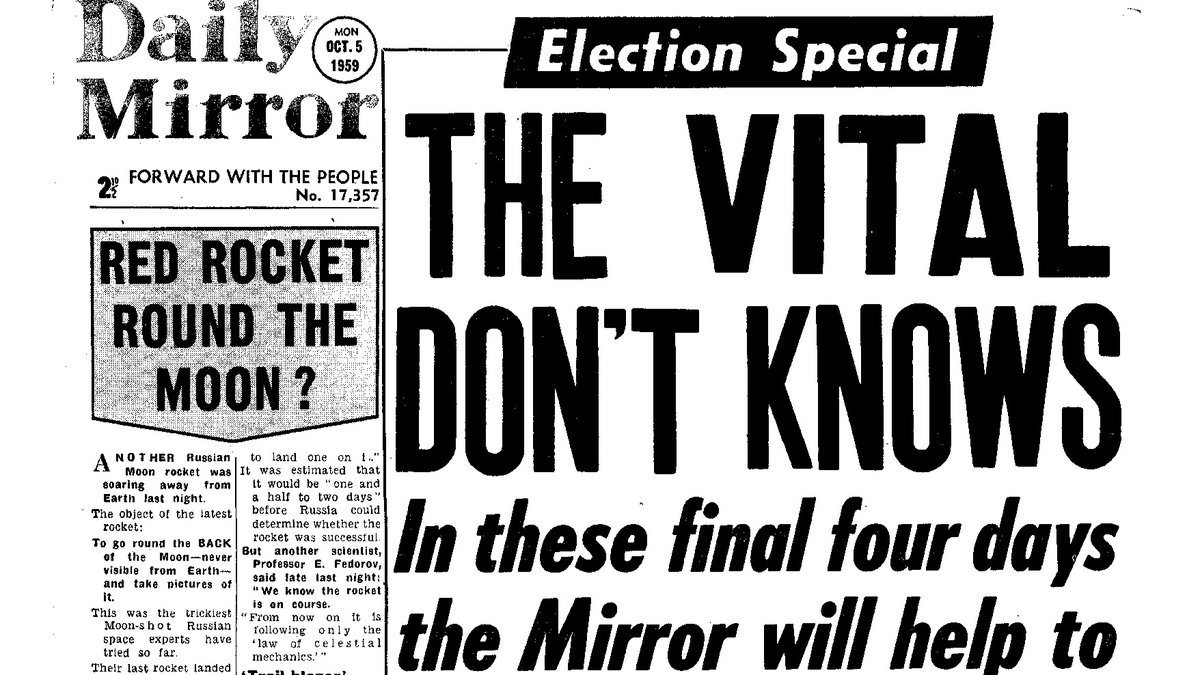
Macmillan kicked off the campaign in Bromley. He talked of the ‘new class of spenders in this country’ whose living standards had improved.
Labour, he argued, were advocating the ‘fatal position’ of Marxist socialism which would undermine ‘the rock of national unity’
Labour, he argued, were advocating the ‘fatal position’ of Marxist socialism which would undermine ‘the rock of national unity’
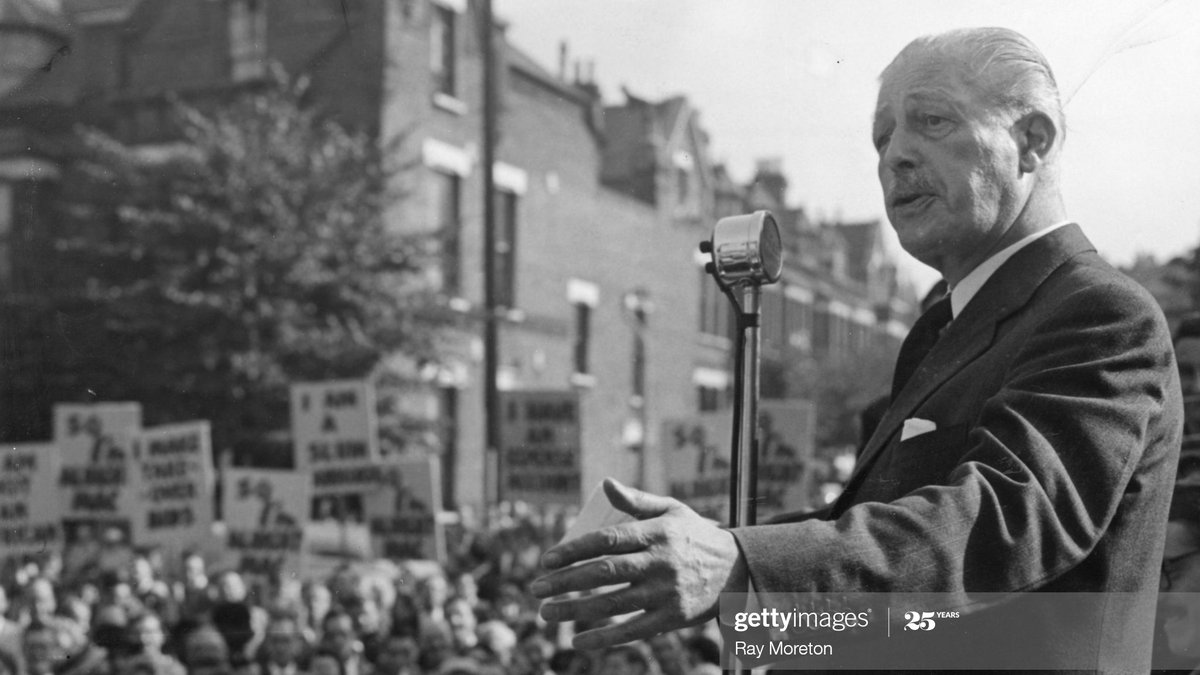
It was thought that the election would become the ‘summit election’ with ‘who should speak for Britain in the big East West talks ahead’ at the centre.
When the Conservative Party released their 1959 Campaign Guide they dedicated 71 pages to foreign affairs.
When the Conservative Party released their 1959 Campaign Guide they dedicated 71 pages to foreign affairs.
The Tories argued that Gaitskell’s had betrayed Britain in response to Suez.
“The Labour Party’s failure to support their own country in time of need aroused feelings of widespread contempt throughout the country”.
“The Labour Party’s failure to support their own country in time of need aroused feelings of widespread contempt throughout the country”.
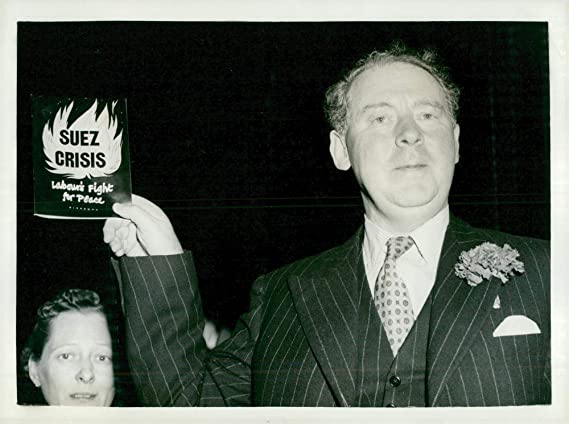
Labour quickly gained ground in the campaign and within the first two weeks had closed the poll lead to 3pts.
Television was thought to be a key battleground, and Labour had good advice from Wedgewood Benn, Woodrow Wyatt and Christopher Mayhew
Television was thought to be a key battleground, and Labour had good advice from Wedgewood Benn, Woodrow Wyatt and Christopher Mayhew

Benn presented 'Britain Belongs To You' were he introduced the public to Labour's 'campaign operations room'
Domestically, the battleground was over the ‘distressed areas’ where pockets of unemployment emerged as industries changed.
Macmillan promised that the first bill his government would introduce would seek to eliminate unemployment in such areas by placing new factories there.
Macmillan promised that the first bill his government would introduce would seek to eliminate unemployment in such areas by placing new factories there.
In a speech in Oldham, Harold Wilson claimed the Tories were to blame for the closure of over 400 mills in Lancashire
This included seventeen closures in Heywood and Royton, twenty-eight in Nelson and Colne, fifteen in Blackburn and seven in Rochdale alone.
This included seventeen closures in Heywood and Royton, twenty-eight in Nelson and Colne, fifteen in Blackburn and seven in Rochdale alone.
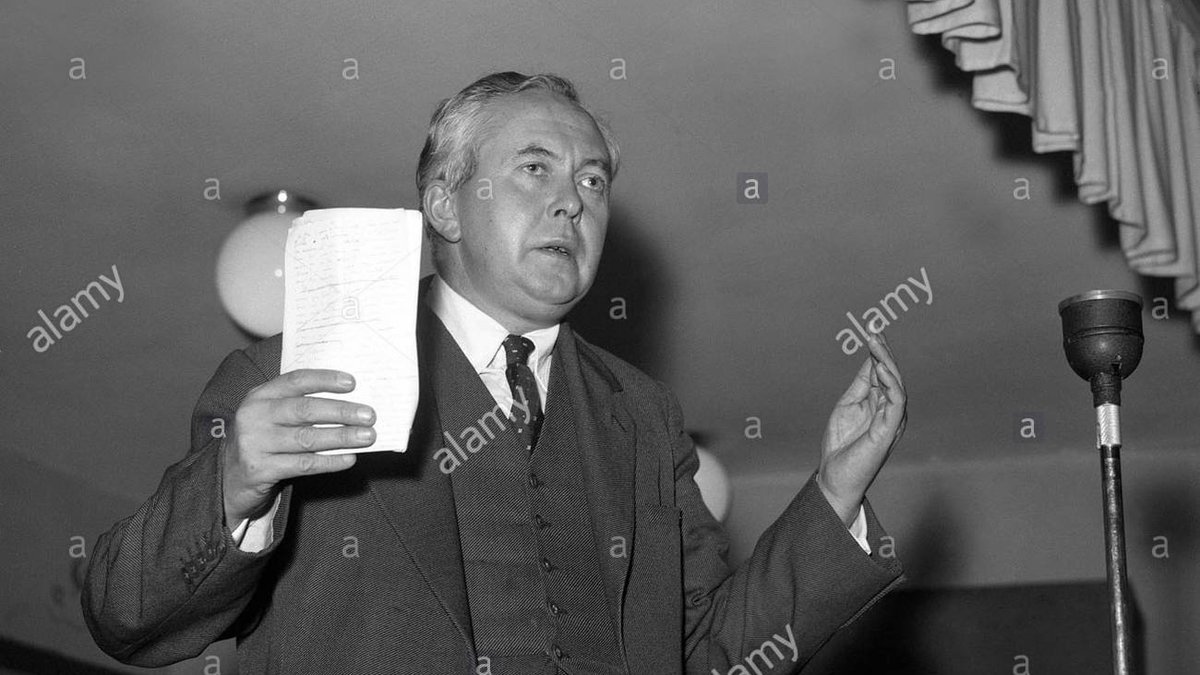
It was calculated that of the 25 parliamentary constituencies on the ‘Cotton Belt’, 15 were marginal
Labour were critical of the governments compensation plan for cotton. Wilson attacked the £2000 compensation figure for directors, compared with £10 for the average worker
Labour were critical of the governments compensation plan for cotton. Wilson attacked the £2000 compensation figure for directors, compared with £10 for the average worker
Macmillan embarked on a 60 mile tour of the mill towns but was heckled along the way.
In Middleton, a protestor shouted ‘You are in the graveyard of Lancashire’.
Placards read ‘500 mills closed – the Tories have written you off’ and ‘Life is bitter under the Conservatives’.
In Middleton, a protestor shouted ‘You are in the graveyard of Lancashire’.
Placards read ‘500 mills closed – the Tories have written you off’ and ‘Life is bitter under the Conservatives’.
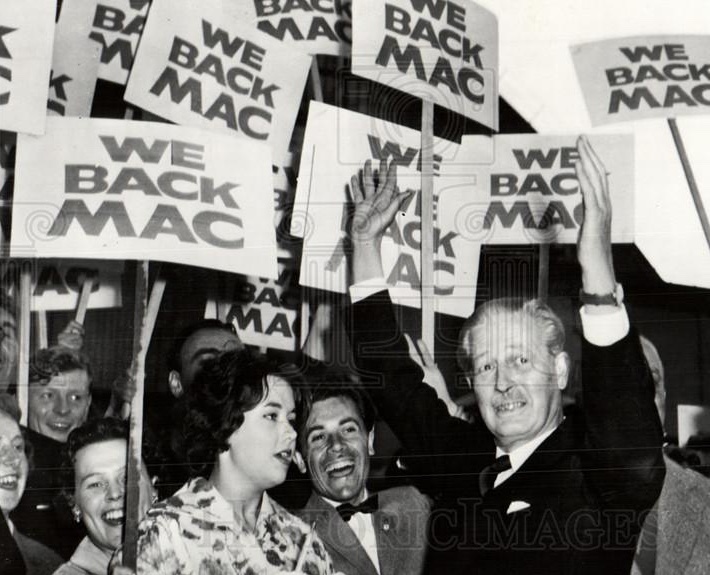
Others were pleased to see him and a huge crowd greeted his arrival at 11am.
A local paper claimed it was the biggest crowd seen since the Prince of Wales visited in the 1920s.
A local paper claimed it was the biggest crowd seen since the Prince of Wales visited in the 1920s.
Gaitskell conducted his own tour of the same areas at meetings in Chorley, Blackburn and Preston.
Alongside Barbara Castle at one rally he remarked that ‘it is impossible to believe that we are basking in Tory prosperity when twenty mills are due to close’
Alongside Barbara Castle at one rally he remarked that ‘it is impossible to believe that we are basking in Tory prosperity when twenty mills are due to close’

With Castle holding just a majority of 489, Gaitskell urged Blackburn to get behind her: ‘She deserves to be rewarded with a smashing majority’
In what was later seen as a decisive factor in the result, Gaitskell gave a speech in Newcastle were he declared:
‘There will be no increase in the standard or other rates of income tax so long as normal peacetime conditions continue’.
‘There will be no increase in the standard or other rates of income tax so long as normal peacetime conditions continue’.

In Wellington, Nye Bevan took aim at as SuperMac’s Edwardian style:
‘We need a government that can address the realities of the twentieth century’ rather than be run by those ‘with nineteenth century minds’
‘We need a government that can address the realities of the twentieth century’ rather than be run by those ‘with nineteenth century minds’
After he was heckled during one speech, Bevan took on a protestor
‘Obviously you have worn a beard to hide your weak mouth’
‘Obviously you have worn a beard to hide your weak mouth’
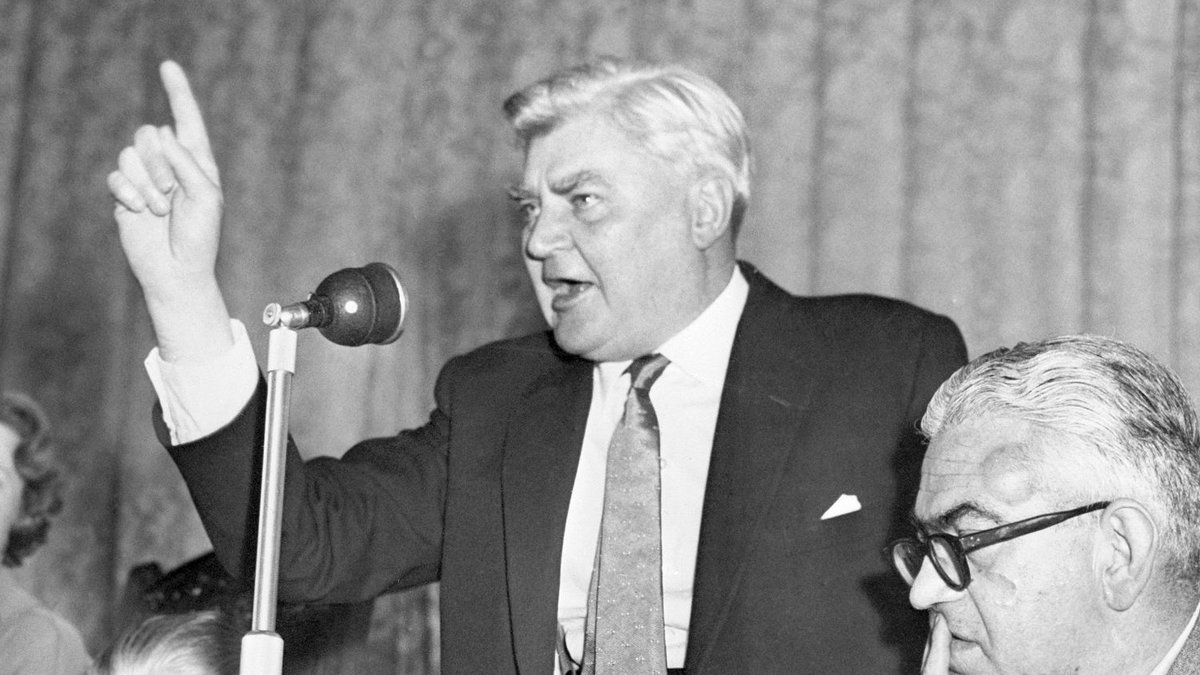
In Wiltshire, Labour’s Deputy Leader James Griffiths said that ‘ordinary people are asking who controls our country’.
‘The power of money is still the greatest danger to our democracy’
‘The power of money is still the greatest danger to our democracy’

Griffiths warned of a rise in unemployment if technology advances unchecked:
‘We are not luddites We must welcome changes which increase our capacity to produce wealth. But that wealth must be fairly shared’
‘We are not luddites We must welcome changes which increase our capacity to produce wealth. But that wealth must be fairly shared’
Patrick Gordon Walker urged the public to reject the ‘Americanisation of our political life’ by showing that our people resent having their politics served up by advertising agents. 
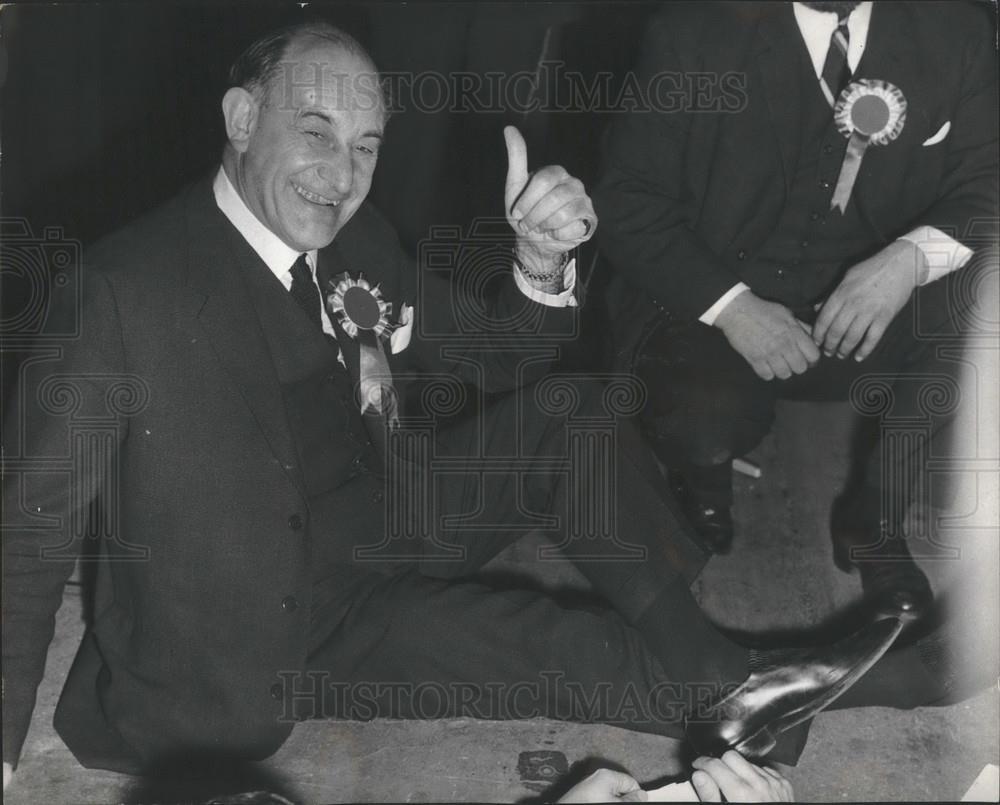
In Battersea, one protestor stopped Gaitskell from speaking by jumping on the stage and breaking his microphone. It resulted in a scuffle between Labour stewards and the protestors.
In Doncaster, Gaitskell enjoyed one of his best election rallies alongside his wife. 1500 people turned up to the Corn Exchange to hear him speak with ‘hundreds listening to the speech outside’.
‘It’s the 1945 spirit all over again’
‘It’s the 1945 spirit all over again’
Gaitskell promised to cover 2000 miles.
On one day, for example, he spoke in seven areas – Stowmarket, Bury St Edmonds, Harleston, Lowestoft and Yarmouth’.
In Braintree, he cracked his shin as he climbed on to a stage.
On one day, for example, he spoke in seven areas – Stowmarket, Bury St Edmonds, Harleston, Lowestoft and Yarmouth’.
In Braintree, he cracked his shin as he climbed on to a stage.
In Hampstead, Dr David Pitt suffered abuse at the hands of Mosley and the White Defence League
https://twitter.com/labour_history/status/1311186018490515456
Aged 63, Oswald Mosley had returned to the British political scene fighting to win North Kensington.
The New York Times concluded:
‘He has finished as a serious worrisome figure on the British political scene, but not as an agitator’.
The New York Times concluded:
‘He has finished as a serious worrisome figure on the British political scene, but not as an agitator’.

In one speech, Mosley advocated ‘sending all the coloured people back to Jamaica’ by having Britain resume sugar buying from there.
This would clear London of ‘these scandals, the brothels, the vice clubs and the dirty tricks used to obtain employment and housing’.
This would clear London of ‘these scandals, the brothels, the vice clubs and the dirty tricks used to obtain employment and housing’.
In Finchley meanwhile, a 33 year old Margaret Thatcher was making a name for herself:
‘The business of the working class is on its way out. After all, aren’t I working class? I work jolly hard I can tell you’
‘The business of the working class is on its way out. After all, aren’t I working class? I work jolly hard I can tell you’

Labour were said to have run a great campaign. With two weeks to go until polling, the Manchester Guardian observed a confident mood
‘It seems less likely than it did a week or two ago that the Conservatives will have a walk away victory’.
‘It seems less likely than it did a week or two ago that the Conservatives will have a walk away victory’.
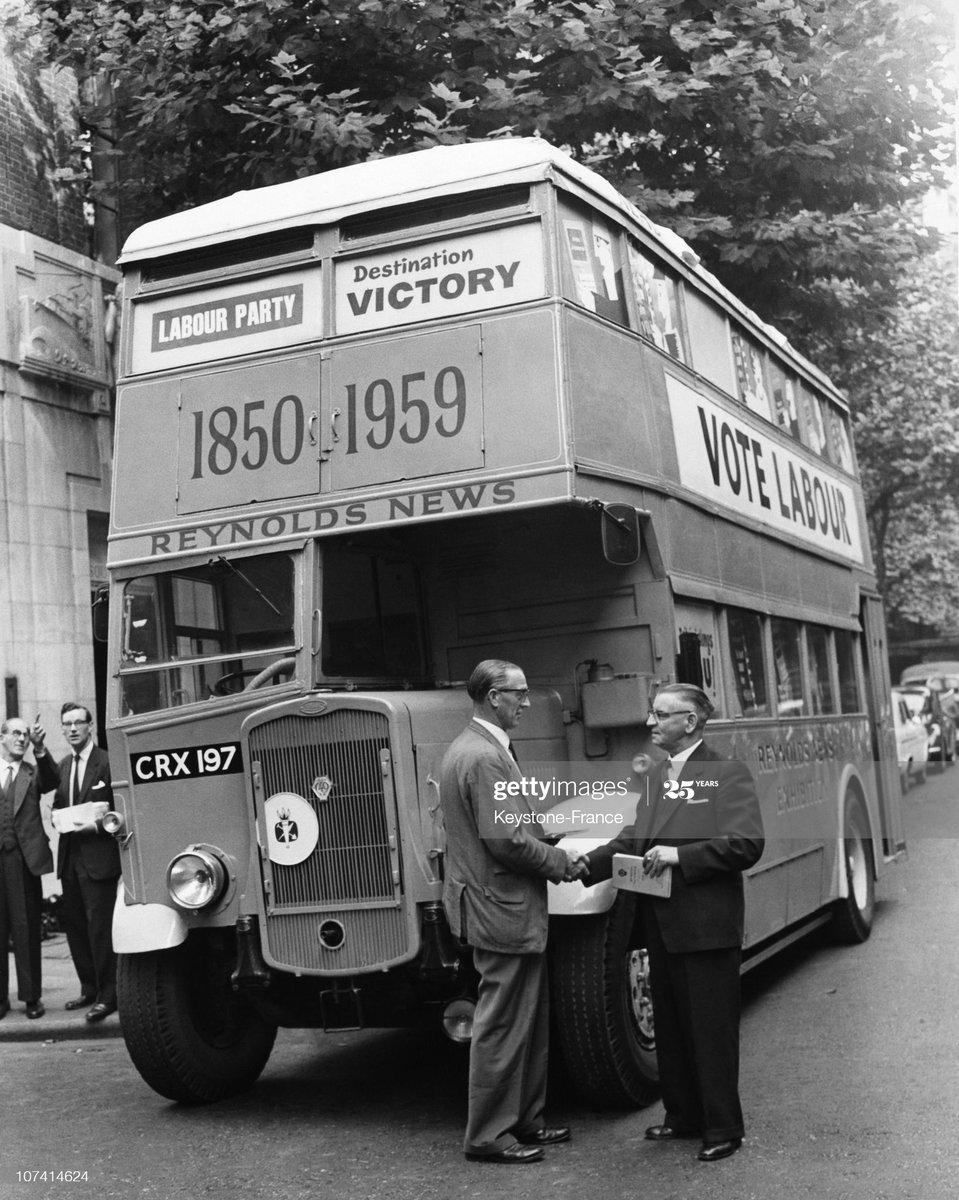
Reg Underhill, Labour’s organiser in the Midlands, spoke of great confidence on the ground:
‘Our canvassers are getting and enthusiastic reception everywhere. Gaitskell has knocked Mac off his perch. It is quite exciting’
‘Our canvassers are getting and enthusiastic reception everywhere. Gaitskell has knocked Mac off his perch. It is quite exciting’
The Economist claimed that ‘there is now a very real possibility that Mr Gaitskell will become the Prime Minister’.
Macmillan wrote in his diary that ‘the socialists had a very successful TV last night – much better than ours. Gaitskell is becoming very expert’. 

Bob McKenzie however claimed a Labour victory would be surprising:
‘The fact is, that at least a third of the working class consistently votes Conservative and there is no evidence that Labour has won over any of this significant section’
‘The fact is, that at least a third of the working class consistently votes Conservative and there is no evidence that Labour has won over any of this significant section’

McKenzie was highly critical of Labour’s strategy:
‘The public is little interested in and probably unable to comprehend explanations of the virtues of physical versus monetary controls or theories of disengagement’
‘The public is little interested in and probably unable to comprehend explanations of the virtues of physical versus monetary controls or theories of disengagement’
‘The electorate will be choosing between teams of chaps and their over-riding concern is likely to be with the respective merits of the team captains’.
Labour were said to have used TV better but were in danger of coming across too polished.
Richard Hoggart said that on the whole the political broadcasts have been ‘abysmally bad’.
Richard Hoggart said that on the whole the political broadcasts have been ‘abysmally bad’.

Macmillan called for calm:
‘Whatever happens, about half the people will vote one way and half the other. I do not think it is much good saying that one half consists of crooks and rascals and the other idealists’
‘Whatever happens, about half the people will vote one way and half the other. I do not think it is much good saying that one half consists of crooks and rascals and the other idealists’
On the same night, Montgomery intervened with a ‘right hook’ to argue that:
‘Anyone who votes Labour at this time should be locked up in a lunatic asylum’.
‘Anyone who votes Labour at this time should be locked up in a lunatic asylum’.
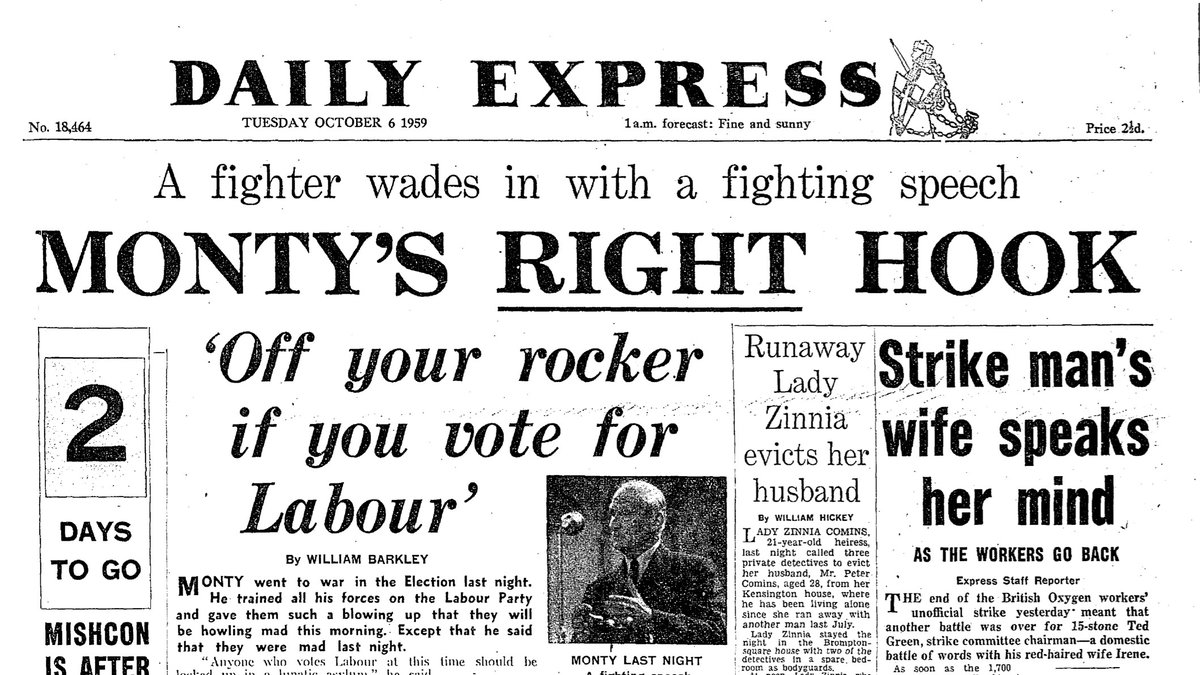
On October 3rd, Gaitskell arrived in Liverpool to a ‘rip roaring reception’ as people lined the streets with torches.
Known as the ‘Suez Torches’, the party was reviving a popular protest that had occurred in an anti-Suez demonstration.
Known as the ‘Suez Torches’, the party was reviving a popular protest that had occurred in an anti-Suez demonstration.

Outside the St George’s Hall, Gaitskell told a crowd of thousands: ‘Victory is certain.
A day later in London, Gaitskell again predicted that Labour was on course for victory
A day later in London, Gaitskell again predicted that Labour was on course for victory
‘I don’t want to sound over confident but i believe we are going to win. The important thing in the next few days is the door step work and getting people out to vote’. 

On October 5th Gaitskell gave - what pundits claimed was an ‘Impressive Image’ - on a TV broadcast
He began by claiming that the election had been fought on ‘Labour’s programme’ and that their social reforms would help life ‘five or six million out of hardship and distress’
He began by claiming that the election had been fought on ‘Labour’s programme’ and that their social reforms would help life ‘five or six million out of hardship and distress’
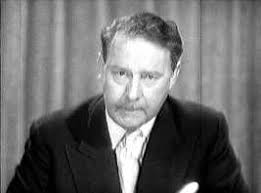
‘We need to build more council houses not fewer…and more hospitals to do away with the queues of sick people who can not get seen’ 

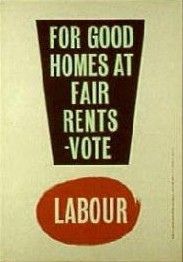

On Suez, he argued that ‘whatever one might think of Labour, we would never, never never’ have put Britain in that ‘fiasco’.
The Guardian reported that it was an effective broadcast.
‘He has grown tremendously as a television personality and now fully understands how the medium should be used to address intelligent viewers. He always flatters us as to our intelligence”
‘He has grown tremendously as a television personality and now fully understands how the medium should be used to address intelligent viewers. He always flatters us as to our intelligence”
With four days to go a poll showed the Tories ahead on 39.5% to Labour’s 38% but with almost 20% still undecided.
Launching into an attack, Gaitskell said the Tories
‘are the party of the past, the party of jingoism and international anarchy, the party of out of date colonialism, the party of Cyprus and Suez, the party of privilege, the party of snobs and the servile and the stuffed shirt’
‘are the party of the past, the party of jingoism and international anarchy, the party of out of date colonialism, the party of Cyprus and Suez, the party of privilege, the party of snobs and the servile and the stuffed shirt’

In Nottingham, Gaitskell was interrupted by hecklers during an open air rally
‘You are just a lunatic fringe. It is time you went to the asylum were you belong’
‘You are just a lunatic fringe. It is time you went to the asylum were you belong’
In a final pitch to the electorate, Morgan Phillips lamented Britain’s decline on the world stage
‘Once the world had listened to Attlee and Bevin. But who listened to Britain now?’
‘Once the world had listened to Attlee and Bevin. But who listened to Britain now?’
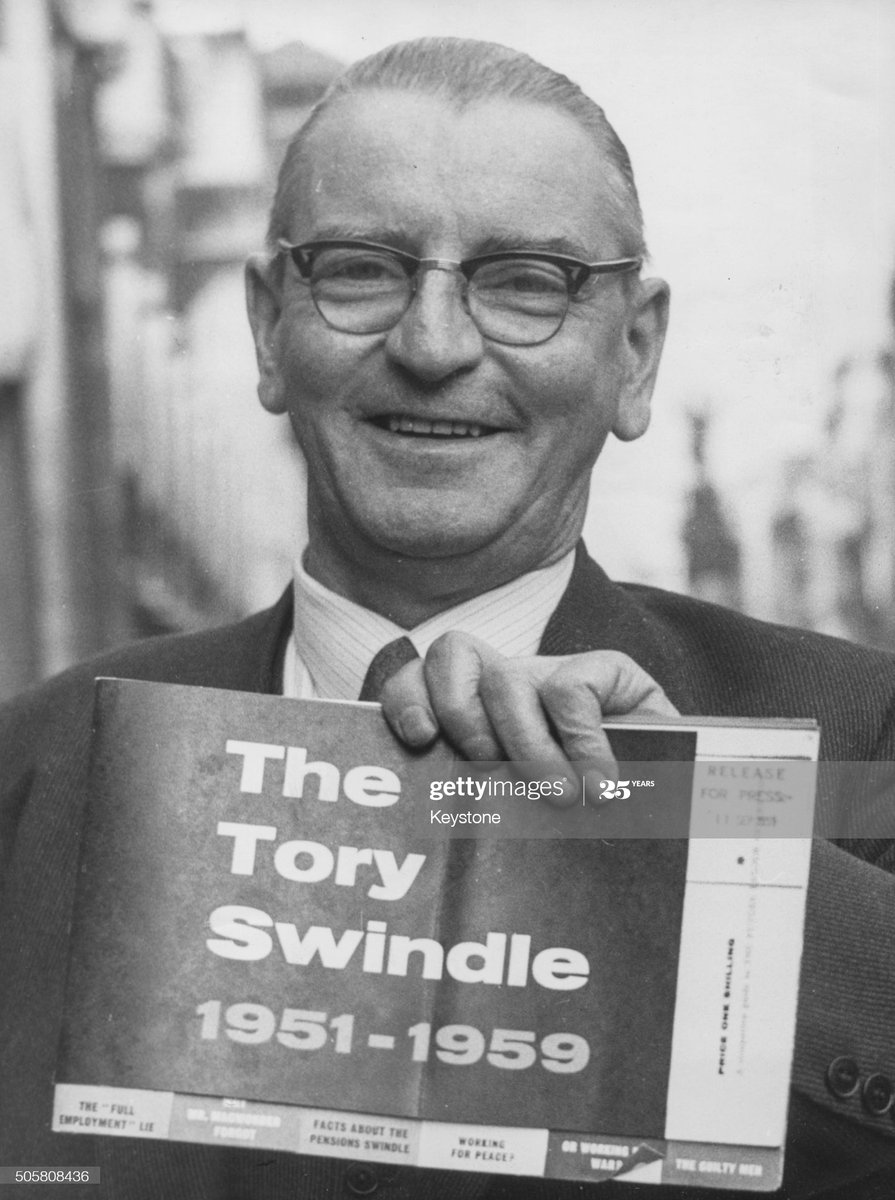
Phillips also suggested that with television now a huge part of the campaign, press conferences could be held by the three party leaders together:
“We could put them before television cameras too’
“We could put them before television cameras too’
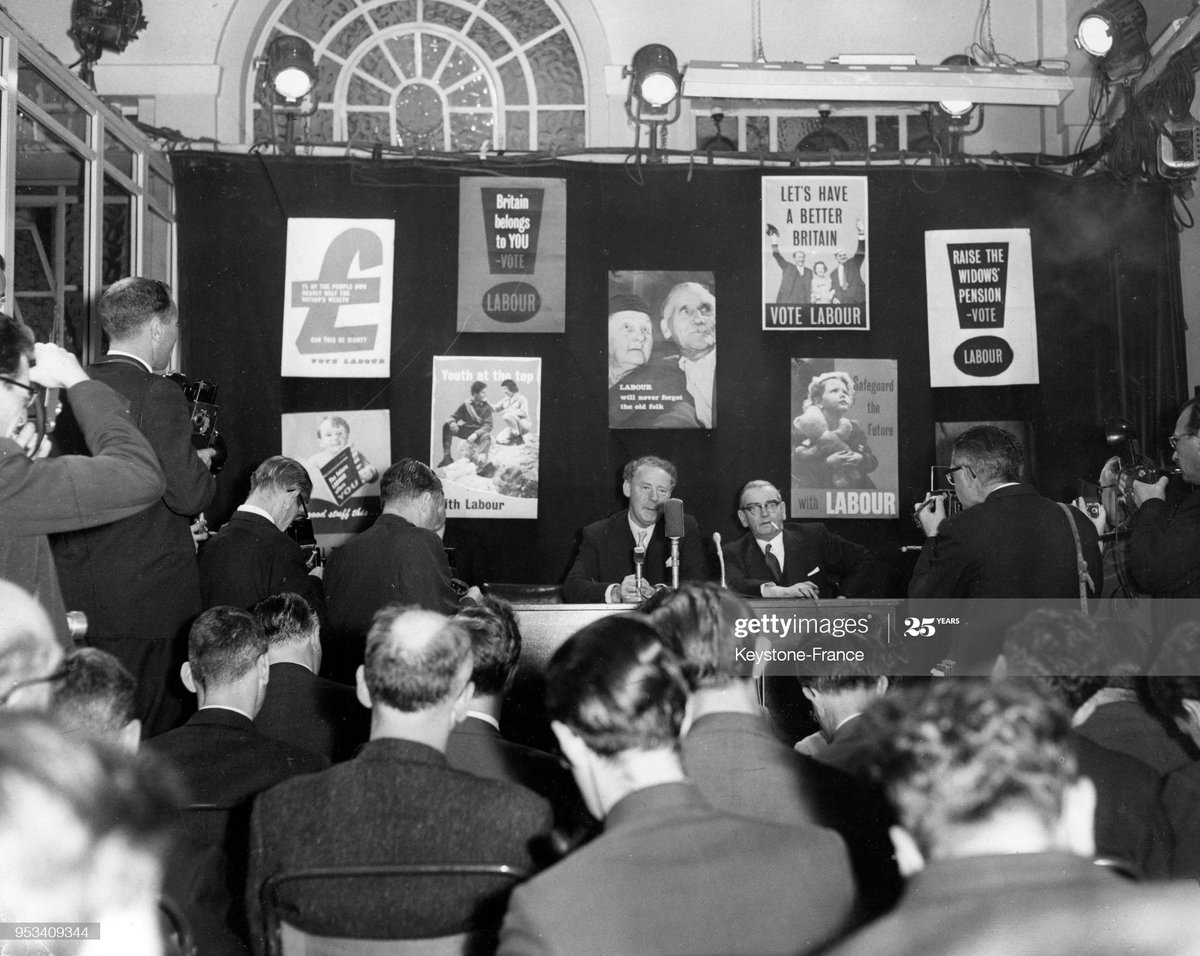
On the eve of poll, Herbert Morrison made an intervention to warn supporters that victory was not yet assured
‘Reports from our people are cheerful and reasonably optimistic: but we have not won yet.
‘Reports from our people are cheerful and reasonably optimistic: but we have not won yet.
In an appeal to women, he urged them to ‘go out and vote early and not wait for the old man to come home’.
As the campaign drew to a close, the Washington Post called it a ‘dead-heat’:
‘Gone is the smugness that characterised the approach of Macmillan a few months ago’
‘Gone is the smugness that characterised the approach of Macmillan a few months ago’

Gaitskell concluded the campaign at a meeting of factory workers in Leeds:
‘Don’t let the telly keep you from the poll. Leave the kids at home to watch Rawhide. They can tell you what happened when you get back’
‘Don’t let the telly keep you from the poll. Leave the kids at home to watch Rawhide. They can tell you what happened when you get back’
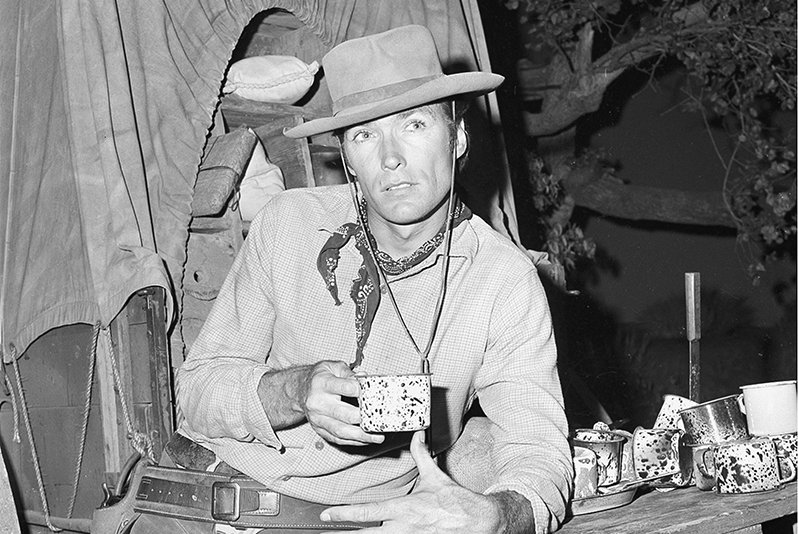
As the BBC began its election night coverage, they reported great confidence at Transport House....
Morgan Phillips claimed
‘I think our opponents have been successful in exploiting the financial angle and misleading the people about the cost of the Labour programme’
‘I think our opponents have been successful in exploiting the financial angle and misleading the people about the cost of the Labour programme’
Phillips believed that the British voters had made a grave error
‘The electorate having sown the wind will now reap the whirlwind’
‘The electorate having sown the wind will now reap the whirlwind’

Phillips defended the party’s programme:
‘Our programme was imaginative and constructive. If we have fallen down it is because we have not convinced the people of that.’
‘Our programme was imaginative and constructive. If we have fallen down it is because we have not convinced the people of that.’
TGWU secretary Frank Cousins added
‘What grieves me is that the people can’t tell the difference between Liberal and Labour’.
‘What grieves me is that the people can’t tell the difference between Liberal and Labour’.
The Manchester Guardian declared it ‘The Middle Class Victory’
‘Macmillan cannot have hoped for a clearer vote of confidence. No Labour leader will find his way to downing street unless the renationalisation plans are abandoned’.
‘Macmillan cannot have hoped for a clearer vote of confidence. No Labour leader will find his way to downing street unless the renationalisation plans are abandoned’.
‘The rising young voter will not support a party tied to one class, nor can any reasonable man be happy to see the policy shaped by trade union block votes’.
In Finchley, Margaret Thatcher increased the Tory majority from 12,825 to 16,260.
The Conservative majority in Parliament – of 107 – was their best result since the war.
The Conservative majority in Parliament – of 107 – was their best result since the war.
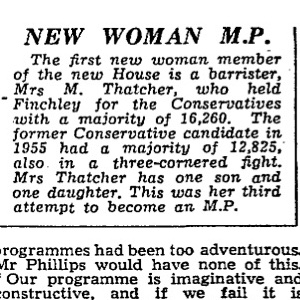
• • •
Missing some Tweet in this thread? You can try to
force a refresh
